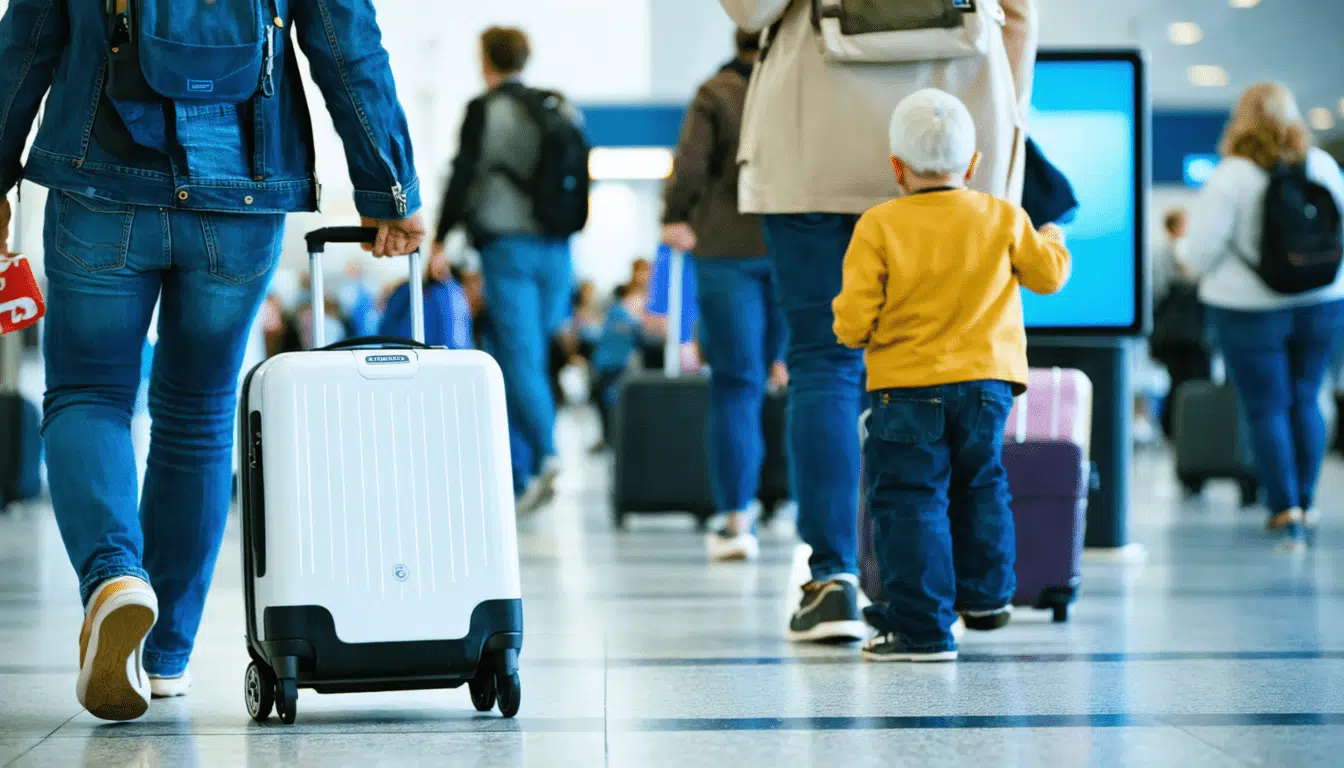Landing in Africa: Navigating Luggage Weight Limits with Ease
Have you ever meticulously packed for a trip to Africa, only to find yourself sweating bullets at the airport scales, fearing another scenario of paying exorbitant overweight baggage fees? Trust me, I have been there, clutching my extra trainers as if they were gold bars while the airline agent shook her head with a polite, yet firm, refusal to let that tenth pair in without a charge. So, why do we constantly risk landing in luggage chaos, especially when exploring a continent as vibrant and diverse as Africa?
Understanding the maze of airline luggage policies can feel like deciphering a new language. Each major airline boasting flights to Africa has its own set of rules on what constitutes a reasonable weight, leaving us all fumbling for answers when it comes to carry-ons and checked bags. Is it 23kg or 15kg? And dare we hope for a miracle in the form of two-by-fifty when it comes to our checked companions?
Unpacking Country-Specific Luggage Rules
Digging deeper into the destination specifics, things can get even more daunting. Do the limits change when flying into Johannesburg versus Cairo, and does that new border crossing at Nairobi warrant a quick rummage through your suitcase? With potential overweight fees lurking around every airport corner, checking weight regulations with local airlines, especially for intra-continental flights, is a nifty strategy to sidestep unexpected expenses.
Smart Packing: Your Ticket to Hassle-Free Travel
But how do we beat the baggage blues and still travel in style? That’s where smart packing steals the show. Imagine fitting all your essentials into a single lightweight suitcase that slides under the limit, leaving room for those souvenirs you’ll inevitably find in an African bazaar. A dash of creativity and a sprinkle of discipline can go a long way—roll clothes, prioritize essentials, and perhaps swap that hard-shell suitcase for a soft-sided marvel.
And for those times when one bag simply won’t cut it, have you pondered options like shipping ahead or luggage-sharing services? The modern travel landscape has thrown open a world of clever solutions just waiting to be explored.
So, next time you’re gearing up for that unforgettable African adventure, let’s not have your weighty worries cloud the excitement. Stick around as we unpack these topics with practical advice and make sure your luggage, just like your journey, stays light and joyous.
Understanding Airline Luggage Policies for African Destinations
Overview of Common Luggage Policies Among Major Airlines Flying to Africa
So, you’re dreaming of the vast savannas and rich cultures of Africa, eh? Exciting times ahead! But before you get carried away with packing your safari hat and binoculars, let’s dive into something a bit less thrilling but incredibly important—understanding airline luggage policies. Because let’s be honest, no one wants to be that person at the airport pegging off clothes to reduce your bag’s heft while the check-in queue gets longer.
Now, if you’ve travelled internationally before, you know that airlines have a knack for varying their luggage policies. When it comes to flights to Africa, big players like Ethiopian Airlines, Emirates, and Qatar Airways have some pretty similar rules overall, but the devil is always in the details. Typically, these airlines specify a checked baggage allowance of around 20 to 30 kilograms for economy class, while business and first-class passengers can often bring considerably more.
Carry-on luggage is a bit more standardized, usually hovering around 7 to 10 kilograms for one bag. Sounds simple, right? Kind of like when you open the fridge for a midnight snack—how hard can it be? But then, there’s always that one little jar you can’t reach…
Explanation of Weight Limits for Checked and Carry-On Baggage
Okay, let’s break this down. From my own misadventures, I had once packed everything from my drone to my hiking boots and ended up facing an overweight fee in Nairobi. Trust me, it stings. It turns out, weight limits for checked baggage are more than just numbers; they can impact your travel experience and wallet. Depending on the class of service and your frequent flyer status, allowances can vary significantly. Most airlines offer 20-23 kg in economy class as your standard checked baggage, but who wants to stay standard?
As for that little tag-along, the carry-on, it comes with its own set of rules. Depending on the airline, your carry-on might have to fit within a particular dimension and stay under around 7 kg. Remember, they’re keeping an eye on this because carry-ons compete with other passengers’ bags in those precious overhead bins. If you’re like me and sometimes forget that an extra book or two can push the scale weight a bit over, then keeping a keen eye on this figure is crucial.
Tips for Confirming Luggage Allowances Before Booking
So, how do you safeguard against surprise expenses? Well, the obvious one is checking—rechecking, and possibly triple-checking—the current luggage policies of the airline you plan to book with. You might be thinking, But, who has the time? Remember when your teacher would harp on about double-checking your answers? It’s like that—annoying but useful. Most airlines have handy baggage calculators on their websites. Plus, customer service hotlines actually exist for this reason (just make sure you call during business hours unless you enjoy the dulcet tones of hold music).
Here’s a nifty tip: set Google Alerts for any airline regulation changes if you’re booking far in advance. That way, you’re ahead of the game if they decide to switch things up six months from now. It’s like being the cool kid who already knows the surprise ending to a new movie. And for ultimate peace of mind, finally, keep all your booking references and confirmations with luggage details handy—because who wants to risk paying more than you bargained for?
There you have it, a head start on navigating the practical side of your African adventure. Now you’re ready to get back to choosing which safari lodge you’ll want to wake up in. But before you go, ask yourself: Do I really need three pairs of hiking boots? Knowing your luggage limits means starting your journey on the right foot—or the left, if that’s your preference.
Country-Specific Weight Regulations and Fees
Planning a trip to Africa? Fantastic! But before you start dreaming about safaris and exotic beaches, let’s talk about something that can either make or break your journey: understanding the luggage weight regulations that vary from one country to another in Africa. You might think, It’s just luggage, how complicated can it be? Well, strap in—because the answer is quite. Different countries have their own rules, and missing a detail here can mean hefty fees. Let’s break it down.
South Africa: A Gateway with Specific Rules
Take South Africa, for instance. One of the continent’s most visited countries, and for good reason, but their luggage policies can be a bit like encountering a surprise pothole on an otherwise smooth road. Most airlines flying into South Africa will allow around 23kg (50 pounds) for checked luggage, which is fairly standard, but aim for lightness on carry-ons, where the limit is often closer to 7kg (about 15 pounds). One time, I arrived at O.R. Tambo International Airport only to discover that my carry-on was over the limit by just 2kg. Long story short, I ended up buying overpriced, last-minute souvenirs just to lighten the load—lesson learned!
If you go over the weight limits, expect to pay for it—literally. Typical charges for excess baggage can range from $20 to $30 per kg. Wouldn’t it be better to buy some nice meals instead? Keep that in mind while packing. Also, be sure to check with airlines specifically operating within South Africa, like South African Airways or Kulula, as their rules can slightly differ from international carriers.
Exploring Egypt? Check Your Bags
Heading north to Egypt? The land of pharaohs and pyramids has its own baggage nuances. For most flights landing in Cairo, you’ll find similar weight allowances to South Africa with around 23kg for checked bags. Carry-on restrictions can vary based on the airline, often capped at 8kg. My experience in Egypt taught me a valuable lesson when I had to reshuffle my carefully packed souvenirs because of a minor oversight in weight.
Extra charges in Egypt are similar to South Africa, but a bit kinder on your wallet, generally around $15 to $25 per additional kilogram. Pro tip: Always keep some Egyptian pounds handy if your bags are a tad too heavy; it might just save you a bit of time and hassle at the counter.
Kenya: Keep Fees at Bay
Kicking off an adventure in Kenya? It’s one of Africa’s gems, but like any gem, it comes with a few twists regarding luggage. Airlines flying to Nairobi generally allow 23kg for checked luggage. However, domestic flights within Kenya often have tighter constraints—think 15kg—especially when flying to smaller airports. I once found myself hastily redistributing the weight after an international flight to Nairobi before catching a domestic flight to the Maasai Mara. Better that than paying $40 more dollars in excess fees!
For intra-country travel, always double-check policies for local carriers like Kenya Airways or Fly540. They might have smaller planes where weight means everything, and those fees can sneak up on you if you’re not careful.
Why Intra-Continental Flights Demand Extra Attention
Flying within Africa? I empathize with the untold hours I’ve spent at information desks while chasing intra-continental flights. It’s almost like two entirely separate trips. The weight limits are often stricter due to smaller aircraft, and fees can be downright unforgiving if you’re not prepared. Local airlines like Ethiopian Airlines offer mere 20kg allowances, which can shrink even further for domestic hops in smaller countries.
So, how do you sidestep a surprise charge? Simple: check luggage allowances during every booking stage. If there’s a magical tool or hotline, use it. Cross-reference the main airline’s policy with local carriers flying you within Africa, and always leave a little buffer in your luggage weight—we’ve all been that person frantically trying to rearrange bags in line, and trust me, it’s an experience you’ll want to skip.
Luggage weight limits may seem like a trivial detail amidst more thrilling travel plans, but as we’ve seen, overlooking this can turn into a costly affair. It’s all about being prepared and informed. Stick to these tips, and you’ll breeze through airports on your way to your African adventure with fewer financial and mental detours.
Packing Strategies to Avoid Overweight Charges
Oh, the dreaded moment at the airport when the scales flash numbers higher than your expectations (and frankly, your propensity to pay for extra baggage weight). It’s a scene we all fear, isn’t it? That sheepish shuffle as you try to shed unnecessary pounds from your bags right there in front of everyone. But fear not—I’ve got your back with some smart packing strategies to help you avoid those pesky overweight charges altogether.
Essential Tips for Packing Light
First things first, let’s talk about the fine art of packing light. It’s a skill that’ll serve you well across continents, but it’s especially crucial when packing for Africa, where a heavy bag can quickly become a burden as you hop between flights or embark on those exciting safari adventures.
Start by making a comprehensive packing list—and stick to it. You may be tempted to pack those five extra t-shirts “just in case,” but trust me, you won’t need them. Think critically about each item and ask yourself, “Do I really need this?” It’s tough love, but it works.
Another nifty trick is to choose versatile clothing that can be mixed and matched. A few key pieces that work in different combinations can save more space than you’d think. It feels a bit like playing wardrobe Tetris—but once you get it right, you’ll have a compact, well-organized suitcase without sacrificing style or comfort.
Using Lightweight Luggage and Packing Efficiently
Honestly, your suitcase itself can make or break your packing success. Opt for lightweight luggage—those few pounds saved by not lugging around an old behemoth can make quite the difference. Consider investing in modern luggage made from materials like polycarbonate or aluminum, which offer durability without extra weight.
When it comes to arranging your items in that sleek new suitcase, it’s all about maximizing space. Tried and true methods like rolling clothes (instead of folding them) can save space and keep things less wrinkly. Packing cubes are another traveler’s best friend, organizing your clothes efficiently and compressing them to squeeze every inch of space.
Travel Accessories That Help Manage Luggage Weight
There are a few nifty accessories that can help you stay within those weight limits. Have you ever considered a digital luggage scale? It’s a game-changer! Just weigh your bag before heading to the airport, and you’ll know exactly where you stand—before those airlines have a say in it.
Speaking of accessories, inflatable travel pillows, collapsible water bottles, and even quick-dry towels can be huge space savers. I once packed a bulky neck pillow and paid the price—literally. By switching to an inflatable pillow, I freed up space for souvenirs and sidestepped heavy baggage fees.
How to Rethink Footwear Packing
Lastly, shoes! They’re the sneaky weight gainers of the packing world. It pains me to say this, but maybe that fifth pair of shoes can stay home. Instead, choose a versatile pair suitable for both daytime adventures and evening dining. And always wear your heaviest shoes while traveling to save space and weight in your bag.
Are you getting excited yet? With these strategies, you’re well on your way to conquering the luggage weight limits for your African adventure. No more awkward scenes at the airport counter, just seamless packing and jet-setting with confidence!
Alternatives and Solutions for Extra Luggage Needs
Have you ever found yourself at the airport, nervously watching the scale, hoping that your suitcase doesn’t tip over the weight limit? It’s a nail-biting moment we can all relate to. But what if I told you there are clever ways to handle extra luggage needs when traveling to Africa without paying those hefty overweight fees?
Shipping Belongings Separately
Here’s a solution many overlook: Why not ship some of your belongings? I remember my cousin Jessica, who was moving to Johannesburg for a job. Instead of dragging multiple suitcases, she opted to ship a box of essentials ahead. Not only did it save her from excess baggage fees, but she also appreciated the light load during her flights. You can consider reliable courier services like DHL or FedEx, which offer international shipping. This method is particularly useful for bulky items or if you’re moving long-term. Prices will vary based on the weight and speed of delivery, but it might just save your wallet from an impromptu workout at the checkout counter.
Luggage-Sharing Services
Ever heard of luggage-sharing services? No? Well, you’re not alone, but trust me, they’re a game-changer. These services pair travelers with extra luggage space with those in need of it. Think of it as the Airbnb for your bags. I gave it a whirl on a trip to Nairobi a few months back. By sharing my spare luggage space with someone transporting goods for a local charity, I managed to snag some extra cash and made a new friend in the process. It’s a win-win, honestly. Websites like Luggage Mule or AirMule offer platforms to find and offer space. Next time you’re packing, check these out—it might just make your journey lighter and your purse heavier!
Handling Excess Baggage Upon Return
So, imagine this: You’ve had an amazing adventure across Africa, and along the way, you’ve picked up a few irresistible souvenirs. Or a dozen. What now? Coming back with more than you left with is more common than we like to admit. One strategy my friend Sandra swears by is packing a lightweight, collapsible bag in her suitcase. This gives her extra space for items collected on her travels without the hassle of lugging around a heavy suitcase. I also recommend checking with your airline about their policies for checked vs. carry-on limits. Being informed helps you strategically pack and avoid last-minute surprises at the gate.
Additionally, you could consider gifting or donating items before leaving Africa. Let’s say you bought a beautiful handcrafted tablecloth in Marrakech but realized you already have a similar one at home. Rather than trying to cram it in your luggage, you could leave it as a gift for someone, thereby lightening your load.
Buddy System: Sharing Excess with a Travel Companion
If you’re traveling with a group or family, you could leverage the buddy system. Back in college, my best friend and I traveled to Tunisia. She, being the shopaholic that she is, overpacked. Thankfully, I had some room to spare and could take some of her load. So, if your traveling partner has some wiggle room in their luggage, take advantage of that! It’s simple but effective—just make sure you’re still within the legal limits and there’s no mix-up with personal belongings.
At the end of the day, managing extra luggage needs when traveling to Africa—or anywhere really—is not just about avoiding fees. It’s about starting and ending your journey with peace of mind, knowing you have options and strategies up your sleeve. By planning ahead and exploring these creative solutions, you can focus on what’s truly important: enjoying the unique and vibrant experiences that Africa has to offer.
Conclusion
Traveling to Africa is a grand adventure, but the last thing you want weighing you down—literally—is the burden of unexpected luggage fees. Understanding airline luggage policies, especially weight limits, is your first step to a smooth journey. By reviewing each airline’s policies and getting familiar with country-specific regulations, you’ll know exactly what to expect, preventing any cumbersome surprises at the check-in counter. It might seem tedious, but we’ve all had that panic at the airport, right? With a little research upfront, you might just avoid it.
When it comes to keeping your luggage within those pesky weight limits, a smart packing strategy can make all the difference. Think light luggage, consider what’s truly essential, and don’t shy away from those nifty travel accessories designed to save space and weight. Have you ever tried packing cubes? They’re a game-changer! By focusing on packing efficiency, not only will you avoid extra fees, but you’ll also gain the elusive sense of freedom that comes from traveling light.
And if you find yourself in need of just a smidge more space—I get it—exploring options like luggage-sharing services or separate shipping can be lifesavers. They provide practical and often cost-effective solutions to deal with excess baggage, allowing you to focus on more important things, like which safari to choose or how to spot a lion in Kruger National Park.
As you prepare for your African adventure, remember that a little planning can lead to a big payoff, allowing you to start your journey stress-free and ready to embrace all that this diverse continent has to offer. So double-check those weight limits, pack wisely, and above all, enjoy your travels. After all, Africa is waiting for you with open arms and countless memories to be made. Safe travels!






